江苏高考英语时态和语态复习
- 格式:doc
- 大小:83.00 KB
- 文档页数:8
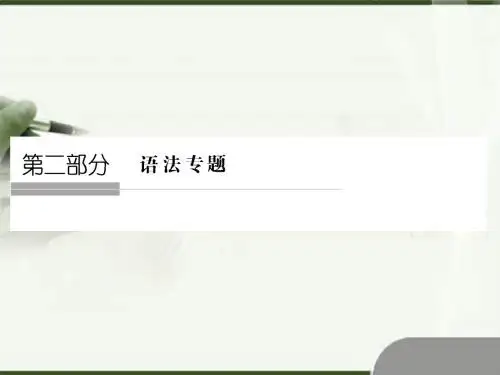
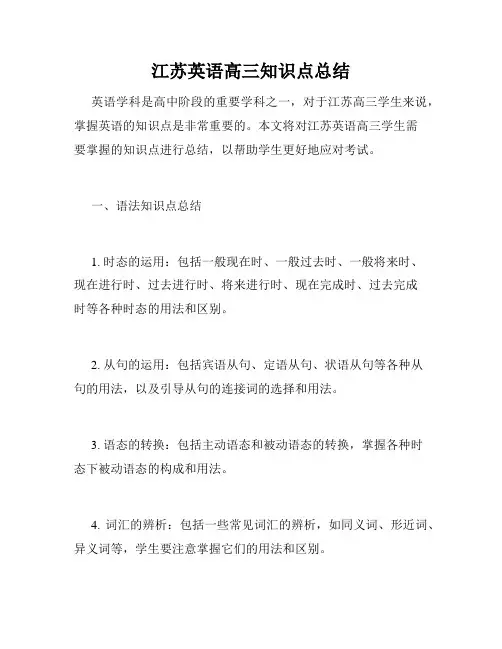
江苏英语高三知识点总结英语学科是高中阶段的重要学科之一,对于江苏高三学生来说,掌握英语的知识点是非常重要的。
本文将对江苏英语高三学生需要掌握的知识点进行总结,以帮助学生更好地应对考试。
一、语法知识点总结1. 时态的运用:包括一般现在时、一般过去时、一般将来时、现在进行时、过去进行时、将来进行时、现在完成时、过去完成时等各种时态的用法和区别。
2. 从句的运用:包括宾语从句、定语从句、状语从句等各种从句的用法,以及引导从句的连接词的选择和用法。
3. 语态的转换:包括主动语态和被动语态的转换,掌握各种时态下被动语态的构成和用法。
4. 词汇的辨析:包括一些常见词汇的辨析,如同义词、形近词、异义词等,学生要注意掌握它们的用法和区别。
5. 并列连词的使用:包括and、but、or、so、yet等连词的用法和连接方式。
二、阅读理解题技巧总结1. 选读题:要仔细阅读题目和选项,根据题意选择正确答案。
可以通过排除法来判断选项的正误。
2. 细节理解题:要仔细阅读原文,找到答案所在的具体位置,并进行准确理解。
3. 主旨归纳题:要抓住文章的中心思想,理解作者的观点和意图,从而归纳出主旨。
4. 推理判断题:要根据文章中的事实细节和线索进行推理和判断。
5. 标题归纳题:要理解文章的大意和结构,选出与整篇文章内容最为相关的标题。
三、写作技巧总结1. 作文的结构:要注意作文的结构布局,有明确的开头、中间段落和结尾。
可以采用问题分析、观点阐述、例证论证等方式进行写作。
2. 语法和词汇的运用:要注意语法的正确性和词汇的丰富性,避免句子结构的单一和词汇的重复。
3. 逻辑和连贯性:要注意段落间的逻辑和连贯性,使用合适的过渡词和句子连接词。
4. 表达清晰和准确:要注意表达的清晰和准确,不模棱两可,避免使用不必要的词语和表达方式。
5. 注意审题:要仔细阅读题目要求,明确写作的目的和要求,避免偏离主题。
四、听力技巧总结1. 注意听力材料的整体内容,抓住关键信息。
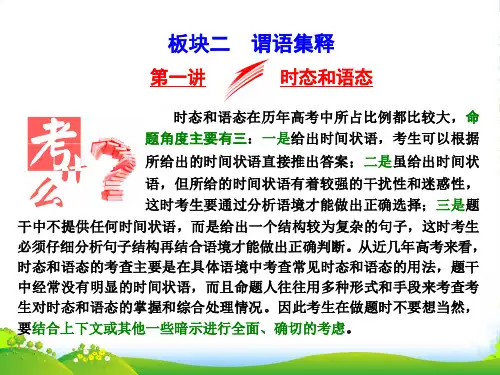
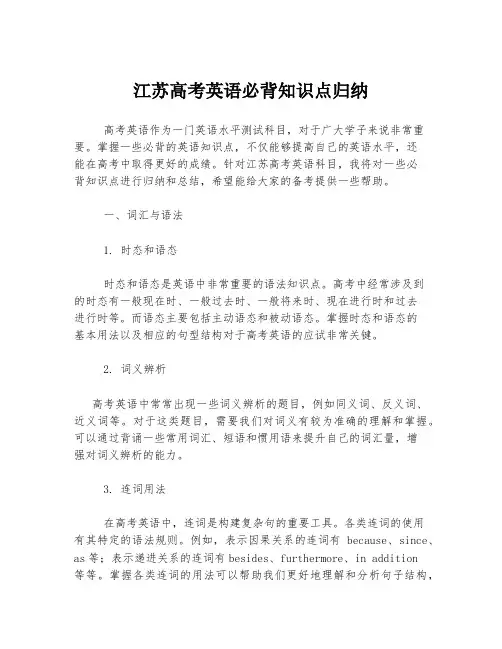
江苏高考英语必背知识点归纳高考英语作为一门英语水平测试科目,对于广大学子来说非常重要。
掌握一些必背的英语知识点,不仅能够提高自己的英语水平,还能在高考中取得更好的成绩。
针对江苏高考英语科目,我将对一些必背知识点进行归纳和总结,希望能给大家的备考提供一些帮助。
一、词汇与语法1. 时态和语态时态和语态是英语中非常重要的语法知识点。
高考中经常涉及到的时态有一般现在时、一般过去时、一般将来时、现在进行时和过去进行时等。
而语态主要包括主动语态和被动语态。
掌握时态和语态的基本用法以及相应的句型结构对于高考英语的应试非常关键。
2. 词义辨析高考英语中常常出现一些词义辨析的题目,例如同义词、反义词、近义词等。
对于这类题目,需要我们对词义有较为准确的理解和掌握。
可以通过背诵一些常用词汇、短语和惯用语来提升自己的词汇量,增强对词义辨析的能力。
3. 连词用法在高考英语中,连词是构建复杂句的重要工具。
各类连词的使用有其特定的语法规则。
例如,表示因果关系的连词有because、since、as等;表示递进关系的连词有besides、furthermore、in addition等等。
掌握各类连词的用法可以帮助我们更好地理解和分析句子结构,准确回答题目。
二、阅读理解1. 主旨理解阅读理解题中经常出现的一类问题就是关于文章主旨的问题。
针对这类问题,我们应该通过捕捉文章的核心思想,理解作者的写作意图,找到文章的主题和中心发展线索。
平时,我们可以多读一些英文文章,提高自己的阅读速度和理解能力。
2. 推理判断推理判断题要求我们根据已有信息,进行逻辑推理和判断。
针对这类题目,我们需要细读文章,准确理解文章内容,同时也要善于运用逻辑思维进行推理。
积极参加阅读理解的练习,做到看得准,理解透。
3. 文章细节阅读理解题中还会有一些关于文章细节的问题。
对于这类问题,我们需要细致阅读并理解文章内容,留意文章中的一些具体细节信息,如人物、事件、时间、地点等。
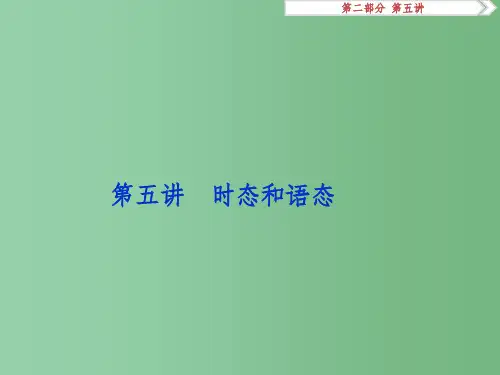
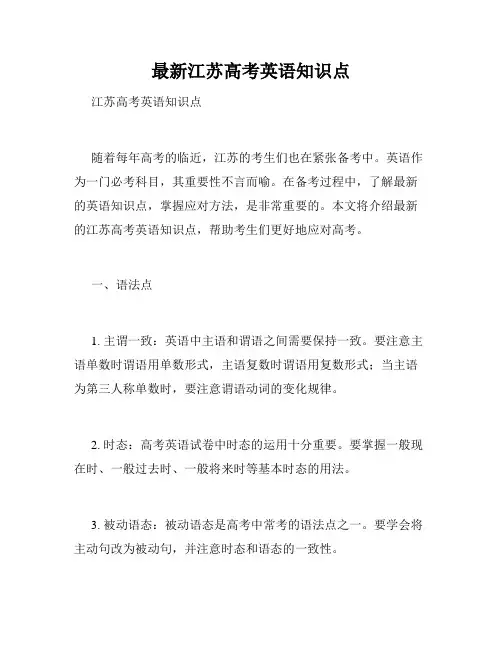
最新江苏高考英语知识点江苏高考英语知识点随着每年高考的临近,江苏的考生们也在紧张备考中。
英语作为一门必考科目,其重要性不言而喻。
在备考过程中,了解最新的英语知识点,掌握应对方法,是非常重要的。
本文将介绍最新的江苏高考英语知识点,帮助考生们更好地应对高考。
一、语法点1. 主谓一致:英语中主语和谓语之间需要保持一致。
要注意主语单数时谓语用单数形式,主语复数时谓语用复数形式;当主语为第三人称单数时,要注意谓语动词的变化规律。
2. 时态:高考英语试卷中时态的运用十分重要。
要掌握一般现在时、一般过去时、一般将来时等基本时态的用法。
3. 被动语态:被动语态是高考中常考的语法点之一。
要学会将主动句改为被动句,并注意时态和语态的一致性。
4. 同位语从句:同位语从句是考察对句子结构的理解和分析能力。
要注意同位语从句的引导词和结构,掌握其用法。
二、阅读理解1. 短文理解:高考英语试卷中通常会出现多篇短文,要能快速准确地获取信息,并理解文章的整体意思。
2. 篇章结构:阅读理解题也会考察考生对文章篇章结构的理解。
要能把握文章的主旨大意,找出文章的中心句,并理解段落之间的逻辑关系。
3. 推理判断:在阅读理解题中,还会涉及到推理判断。
要基于文章中的信息进行合理推断,理解作者的观点和态度。
三、完型填空完型填空也是高考英语试卷中的重要部分。
在做完型填空题时,考生要注意上下文的逻辑关系,猜测上下文中的词义,掌握上下文的逻辑关系,以填写合适的词语。
四、写作部分写作部分常考的题目有图画作文、书信和应用文写作。
在进行写作时,要注意使用正确的语法和表达方式,注意段落的过渡和结构,以及书写的规范与整洁。
五、听力部分听力部分是考察学生听力能力的重要环节。
在备考过程中,要多进行听力训练,提高听力理解能力和抓住关键信息的能力。
综上所述,了解最新的江苏高考英语知识点,掌握各个考点的内容和应对方法,对高考备考有着重要的意义。
希望考生们能够通过努力学习和练习,取得优异的成绩,实现自己的高考目标。
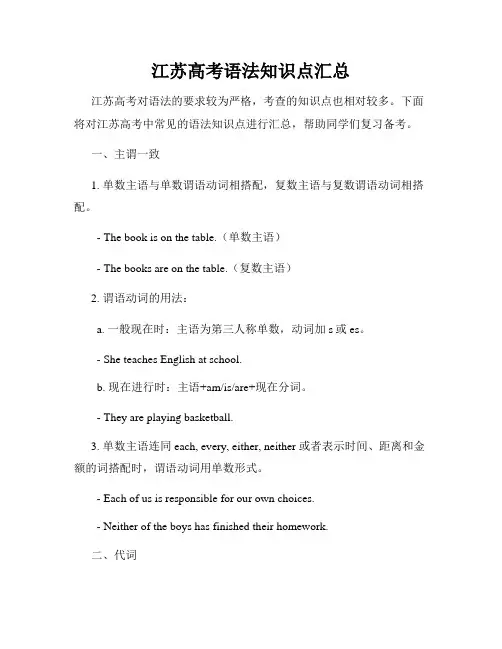
江苏高考语法知识点汇总江苏高考对语法的要求较为严格,考查的知识点也相对较多。
下面将对江苏高考中常见的语法知识点进行汇总,帮助同学们复习备考。
一、主谓一致1. 单数主语与单数谓语动词相搭配,复数主语与复数谓语动词相搭配。
- The book is on the table.(单数主语)- The books are on the table.(复数主语)2. 谓语动词的用法:a. 一般现在时:主语为第三人称单数,动词加s或es。
- She teaches English at school.b. 现在进行时:主语+am/is/are+现在分词。
- They are playing basketball.3. 单数主语连同 each, every, either, neither 或者表示时间、距离和金额的词搭配时,谓语动词用单数形式。
- Each of us is responsible for our own choices.- Neither of the boys has finished their homework.二、代词1. 人称代词的正确使用:- 主格:I, you, he, she, it, we, they- 宾格:me, you, him, her, it, us, them- 形容词性物主代词:my, your, his, her, its, our, their- 名词性物主代词:mine, yours, his, hers, its, ours, theirs2. 指示代词的用法:- This 近指,指离说话人或看到的人或物;- That 远指,指离说话人和听话人都不近的人或物;- These 复数近指,指离说话人或看到的人或物;- Those 复数远指,指离说话人和听话人都不近的人或物。
3. 不定代词的正确使用:- everyone, nobody, somebody, anybody, nobody等作主语时,谓语动词用单数。
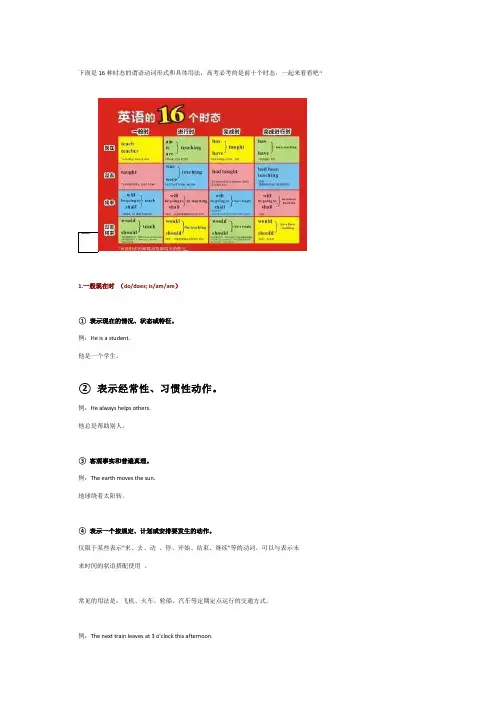
下面是16种时态的谓语动词形式和具体用法,高考必考的是前十个时态,一起来看看吧~1.一般现在时(do/does; is/am/are)① 表示现在的情况、状态或特征。
例:He is a student.他是一个学生。
② 表示经常性、习惯性动作。
例:He always helps others.他总是帮助别人。
③ 客观事实和普遍真理。
例:The earth moves the sun.地球绕着太阳转。
④ 表示一个按规定、计划或安排要发生的动作。
仅限于某些表示“来、去、动、停、开始、结束、继续”等的动词,可以与表示未来时间的状语搭配使用。
常见的用法是:飞机、火车、轮船、汽车等定期定点运行的交通方式。
例:The next train leaves at 3 o'clock this afternoon.下一趟火车今天下午3点开车。
⑤ 在时间、条件和让步状语从句中经常用一般现在(有时也用现在完成时)表示将的来事情。
(即:主将从现原则)例:I will call you as soon as I arrive at the airport.我一到机场就会给你打电话。
When you have finished the report, I will have waited for about 3 hours.等你完成这份报告的时候,我就已经等了将近3个小时了。
2. 现在进行时(am/is/are doing)① 表示此时此刻正在发生的事情。
例:He is listning to the music now.他现在正在听音乐。
② 表示目前一段时间内一直在做的事情,但不一定此时此刻正在做。
例:I am studying computer this term.这个学期我一直在学习计算机。
③ 现在进行时可以表示将来的含义。
a. 瞬时动词的进行一定表将来。
例:I am leaving.我要离开了。
b. 持续动词的进行只有有将来的时间状语或有将来语境中才表将来。
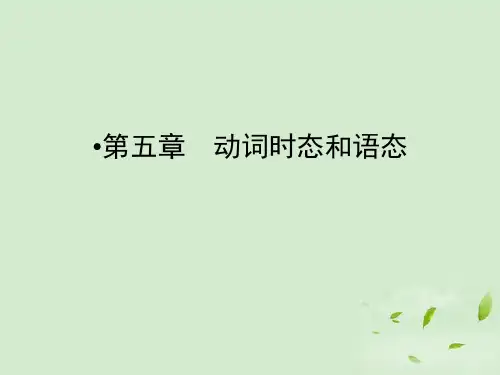
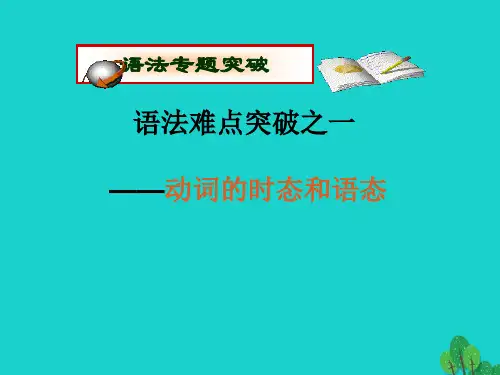
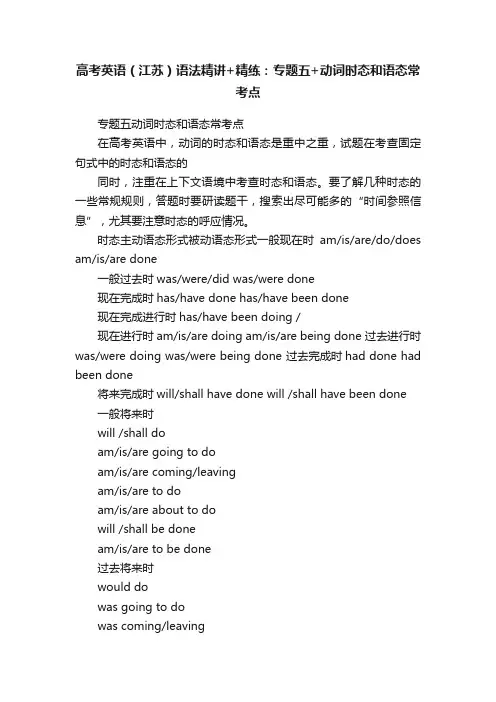
高考英语(江苏)语法精讲+精练:专题五+动词时态和语态常考点专题五动词时态和语态常考点在高考英语中,动词的时态和语态是重中之重,试题在考查固定句式中的时态和语态的同时,注重在上下文语境中考查时态和语态。
要了解几种时态的一些常规规则,答题时要研读题干,搜索出尽可能多的“时间参照信息”,尤其要注意时态的呼应情况。
时态主动语态形式被动语态形式一般现在时am/is/are/do/does am/is/are done一般过去时was/were/did was/were done现在完成时has/have done has/have been done现在完成进行时has/have been doing /现在进行时am/is/are doing am/is/are being done 过去进行时was/were doing was/were being done 过去完成时had done had been done将来完成时will/shall have done will /shall have been done一般将来时will /shall doam/is/are going to doam/is/are coming/leavingam/is/are to doam/is/are about to dowill /shall be doneam/is/are to be done过去将来时would dowas going to dowas coming/leavingwas to dowas about to dowould be donewas/were to be done将来进行时will /shall be doing /1一般现在时一般现在时表示动作的经常性或真理;表示现状、性质、状态时多用系动词或状态动词;在条件、时间、让步状语从句中用一般现在时或现在完成时表示将来;表示预计或规定;方位副词或介词短语放在句首,主语是名词,且全部倒装时,用一般现在时表示正在发生的动作;还可使用于文学作品和文学评论中。
江苏高三英语语法知识点英语语法在高中英语教学中占据着重要的地位,它是英语学习的基础。
在江苏高三英语教学中,语法知识点的学习和掌握对于学生的英语水平提升至关重要。
本文将介绍江苏高三英语教学中的一些重要的语法知识点。
一、时态1. 一般现在时:表示经常性的动作或客观事实。
例句:I play basketball every weekend.2. 现在进行时:表示现在正在进行的动作。
例句:She is studying in the library now.3. 一般过去时:表示过去某个时间发生的动作或状态。
例句:I watched a movie last night.4. 过去进行时:表示过去某个时间正在进行的动作。
例句:They were playing soccer in the park yesterday.5. 一般将来时:表示将来某个时间会发生的动作。
例句:We will go shopping this weekend.二、语态1. 被动语态:将主动语态的动词改为被动语态时,需改变动词的形式。
例句:The book was written by him.2. 主动语态:表示主语是动作的执行者。
例句:She writes a letter.三、句型1. 定语从句:用来修饰一个名词或代词的句子。
例句:The book that I borrowed from the library is very interesting.2. 状语从句:用来表示时间、条件、原因、目的等情况的从句。
例句:He went to bed early because he was tired.3. 宾语从句:用来作及物动词或介词后的宾语的从句。
例句:I believe that she can do it.四、虚拟语气1. 虚拟条件句:表示与现在或将来事实相反的情况。
例句:If I were you, I would study harder.2. 虚拟假设句:表示与过去事实相反的情况。
江苏高考英语知识点归纳江苏高考英语作为高中生升入大学的重要一关,涵盖了丰富的英语知识和技能。
在备考过程中,熟悉并掌握各个知识点是极为关键的。
本文旨在对江苏高考英语的知识点进行归纳总结,帮助考生有针对性地复习备考。
一、语法部分语法是英语学习的重点和难点,也是许多考生容易出错的地方。
江苏高考英语中常考的语法知识点主要有:1. 时态和语态:包括一般现在时、一般过去时、一般将来时、现在进行时、过去进行时、过去将来时、现在完成时、过去完成时、被动语态等。
2. 从句:主要包括宾语从句、定语从句、状语从句等。
3. 名词性从句:主要包括主语从句、宾语从句、表语从句等。
4. 倒装句:主要包括部分倒装和全部倒装,如:Only in this way can we solve the problem.5. 各类从句的连接词:如although, as, unless, since, if等。
通过系统地学习这些语法知识点,并多做相关练习,可以帮助考生在语法选择题上取得高分。
二、阅读理解部分阅读理解是江苏高考英语考试的重头戏,占比较大,考察考生的阅读理解能力和综合运用能力。
而阅读理解的知识点主要涉及以下几个方面:1. 主旨大意:考生需要通过阅读短文,准确把握文章的主题和大意,可以通过研读标题、首句、末段等来帮助理解。
2. 细节理解:在文章中,会有一些与文章内容相关的具体细节信息,考生需要通过细致的阅读,找到与问题相关的答案。
3. 推理判断:有时,文章中的信息并不是显而易见的,考生需要通过理解和推理来得出正确的判断。
4. 词义猜测:在阅读过程中,考生会遇到一些不熟悉的单词或短语,需要通过上下文来推测其意思。
5. 修辞手法:在文章的表达中,常常会用到各种修辞手法,如比喻、夸张等,考生需要通过阅读理解这些修辞手法,理解文章的深层含义。
通过多读文章,掌握不同类型的阅读技巧,并进行大量的阅读练习,可以帮助考生提高阅读理解的能力。
三、写作部分写作考察的是考生的英语表达能力和思维逻辑能力。
高考英语语法一轮复习──动词的时态和语态一、现在时1. 一般现在时:基本结构:do / does / be (am/is/are)用法:(1) 表示现在的习惯动作、状态。
(2) 表示客观规律、真理;特征、性格等。
(3) 用于标题,小说、剧本、图片等中的情节介绍。
(4) 用于时间、条件、让步状从中,表将来。
(5) 表示按计划、规定的时间发生的动作,如时刻表等。
仅限于come, go, arrive, leave, start, begin, return等趋向动词。
(6) 用于一些完全倒装句,表示进行意义。
2. 现在进行时:基本结构:be(am/is/are) doing;用法:(1) 表示现在、现阶段正在发生、进行的动作。
(2) 表示按计划或已安排好的事情,只限于go, come, leave, arrive, start, return, stay, sail, fly 等动词。
(3) 与always, forever, constantly, continually等副词连用,表示反复出现的习惯性动作,往往含有赞赏或厌恶的感情色彩。
注意:1. 表示感觉、心理、结果性的动词一般不用于进行时。
2. 常见表进行的副词、介短:in progress in operation on show3. 现在完成时:基本结构:have/has done用法:(1) 过去发生且结束,但对现在造成影响。
(2) 过去发生且持续到现在。
(3) 在以下两个句型中,其从句要求用现在完成时:It (This) is the first (last, second, third) time that…It (This) is the best (worst, most interesting,…) + n. + that…4.现在完成进行时:基本结构:have/has been doing…用法:表示某动作从过去某个时间开始,一直延续到现在,并且还有可能持续下去。
巩固练习:1. I’ve won a holiday for two days to Florida. I ________ my mum.A. am takingB. have takenC. will have takenD. take2. Because farmland ________ quickly, the government is considering solving the problem.A. is being lostB. is lostC. is losingD. loses3. John and I ________ friends for 8 years. We first got to know each other at a party. But we ________ each other a couple of times before that.A. had been; have beenB. have been; have beenC. had been; had seenD. have been; had seen4. Dad will come to see me when I ________ the training course.A. will have finishedB. will finishC. are finishingD. Finish5. —Did he notice you enter the room?—I don’t think so. He ________ to the radio with his eyes shut.A. listenedB. was listeningC. has listenedD. had listened6. We ________ our new neighbors yet, so we don’t know their names.A. don’t meetB. won’t meetC. haven’t metD. hadn’t met7. I have to go to work by taxi because my car ________ at the garage.A. will be repairedB. is repairedC. is being repairedD. be repaired8. —________ leave at the end of the month.—I don’t think you should do that until ________ another job.A. I’m going to; you’d foundB. I’m going to; you’ve foundC. I’ll; you’ll findD. I’ll; you’d find9. I won’t tell the student the answer to the math problem until he ________ on it for an hour.A. has been workingB. will have workedC. will have been workingD. had worked10. The father as well as his three children ________ skating on the frozen river every Sunday afternoon in winter.A. is goingB. goC. goesD. are going二、过去时1. 一般过去时:基本结构:did/be(was/were)用法:(1) 表示过去的事情、动作或状态,常与yesterday, last night, a moment ago, the next day 等过去的具体时间状语连用。
(2) 表示过去习惯性动作,可用used to / would + do结构。
(3) 用于时间、条件、让步状从中,表示过去的将来。
(4) 用于虚拟语气中:1)用于if条件从句中,表示对现在、将来的虚拟;2)在wish / as if / if only / wouldrather / It is time等+从句中,表示对现在或将来的虚拟。
(5) 表示刚才或过去不知,现在或说话时已知。
(6) 有时可代替一般现在时,表达一种婉转、客气、礼貌、商量的语气。
表示委婉语气的动词有want, hope,wonder, think, intend 等,及情态动词could, would。
2. 过去进行时:基本结构:be (was/were) + doing用法:(1) 表示过去某一时刻或某阶段正在发生的动作。
(2) 表示从过去的某一时间来看按计划会发生的事情,只限于go, come, leave, arrive, start, return, stay, sail,fly 等动词。
(3)用来描述一件事情发生的背景,即一个长动作延续的时另一个短动作已经发生。
3. 过去完成时:基本结构:had + done 总概念:过去的过去。
用法:(1) 用于主从复合句中:两个动作皆发生在过去,前一个动作用过去完成时。
(2) 用于时间状语为“by + 过去时间”的句子中。
(3) 表示过去未曾实现的意图、打算、希望,只限于表示意向的动词,如think, hope, wish, expect, intend,plan, mean 等,意为“原本……但未能……”。
(4) 用于“hardly/scarcely…when; no sooner…than”的主句中。
(5) 用于虚拟语气中:表示与过去的事实相反。
巩固练习:1. Thousands of people took part in the work when the dam ________.A. was builtB. builtC. was being builtD. would be built2. Mr. James ________ a city bus for 20 years. Now he has retired.A. was drivingB. droveC. has drivenD. had driven3. We ________ that you would be able to visit us, but you didn’t.A. expectedB. expectC. had expectedD. were expecting4. Rose ________ a book about China last month, but I don’t know whether she has finished it.A. has writtenB. wroteC. had writtenD. was writing5. Joan could be a very attractive girl, but she ________ no attention to her clothes.A. paysB. paidC. was payingD. had paid6. They should have finished the job before noon, but they ________.A. don’tB. didn’tC. won’tD. haven’t7. Wouldn’t it be better if we ________ a car?A. boughtB. have boughtC. buyD. could buy8. —Your phone number again, please. I ________ quite catch it.—It’s 9586440.A. didn’tB. couldn’tC. don’tD. can’t9. When I was at college, I ________ 3 foreign languages, but I ________ all except a few words for each.A. spoke; had forgottenB. spoke; have forgottenC. had spoken; had forgottenD. had spoken; have forgotten10. —We could have walked to the station. It was so near.—Yes. A taxi ________ at all necessary.A. wasn’tB. hadn’t beenC. wouldn’t beD. isn’t三、将来时1.一般将来时:基本结构:will/shall (用于第一人称)+ do用法:表示将来的动作或状态。